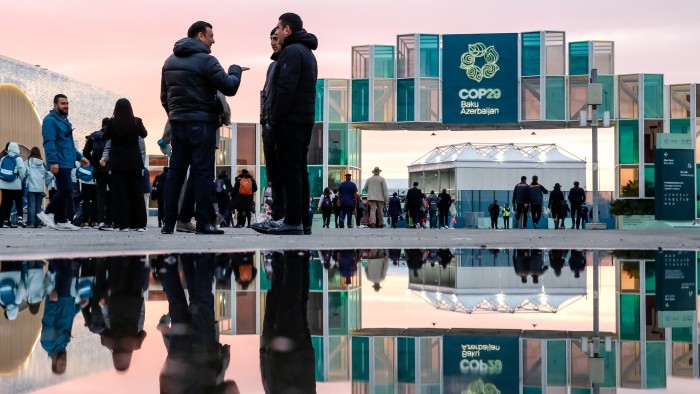Stay informed with free updates
Simply sign up to the Climate change myFT Digest — delivered directly to your inbox.
UN climate COPs have been held for nearly 30 years and, for much of that time, they have included calls for something that has always seemed about as likely as Donald Trump going vegan: new global taxes on shipping and aviation emissions.
At COP29 in Baku this week, things are different. Governments, not just green activists, are backing so-called “solidarity levies” to plug a gaping finance gap bogging down efforts to meet the goals of the 2015 Paris climate agreement.
France, Spain and Kenya are among a small but growing group of nations supporting a task force of experts from bodies like the IMF and OECD that has spent the last year assessing which imposts might work best where.
Levies on shipping, aviation, fossil fuel production and financial transactions are under the microscope. Charges on cryptocurrency trades, plastic producers and billionaires have not been ruled out.
The aim is to whittle the list down to a few concrete options that a coalition of willing nations will be ready to approve by November next year, when Brazil is due to host COP30. The chosen options must be deemed politically and technically feasible, fair and potentially able to raise at least $100bn a year.
The involvement of governments and the depth of analysis sets this effort apart. So does one big driver of the move: money.
The world’s failure to sharply curb carbon emissions means as much as $6.7tn a year of global climate investments will be needed by 2030, economists said in Baku last week.
Of that amount, it’s estimated that at least $2.3tn will be required in emerging and developing countries outside China, and about $1tn of that will have to come from outside those nations.
These numbers explain why the Baku negotiations are so fraught. This is the first COP to negotiate a replacement for the $100bn a year by 2020 that rich countries first pledged to channel to poorer ones in 2009. Turning those billions into trillions at a time of rising geopolitical strains, and a Trump-led US, means negotiators in Baku are eyeing every source of cash, not least long-lasting levies on big polluting industries.
The debate has been galvanised by a landmark decision last year by the international shipping industry to put a price on its emissions. The precise shape of the pricing system agreed at the UN’s International Maritime Organization is not due to be finalised until next year.
But veteran IMO watchers like Professor Tristan Smith of University College London say the pattern of voting so far suggests it is likely to take the form of a levy on each tonne of carbon emitted. A relatively high levy could in turn generate more than $100bn a year.
It is not clear this money would go to countries needing help to deal with climate change. Some nations say it should go to the shipping industry to help it decarbonise.
But the fact that an industry responsible for around 3 per cent of global emissions has taken such a step is already piling fresh pressure on the aviation industry, which in turn has started to demand fossil fuel companies stump up more cash.
“If we are raising money, I would say let’s raise money from the people who have money,” Marie Owens Thomsen, chief economist at the airline industry’s International Air Transport Association, told one lively panel discussion at Baku last week.
Her industry’s collective annual profit was just $31bn, she said, less than the recent earnings of some single oil supermajors.
Countries also deliver billions of dollars a year in fossil fuel subsidies “straight into the hands of oil companies” that could instead be used to finance the energy transition, she added.
The aviation industry is right to be worried. It is subject to a global carbon offsetting scheme agreed in 2016. But even if the system guarantees permanent, additional cuts in emissions, which some doubt, it’s not designed to generate revenue, says a recent IMF paper.
That’s why the solidarity levies task force is studying ways to broaden existing plane ticket duties that at least 21 countries have already imposed, a move estimated to raise as much as $164bn a year.
Precisely what all this will add up to is unknown. Even if more countries adopt levies on things like air tickets, diverting revenues from national treasuries to poorer countries needing climate finance is a big step. But one thing is clear. The days when new carbon levies were deemed too politically impossible to be on the table are well and truly over.
Read the full article here

